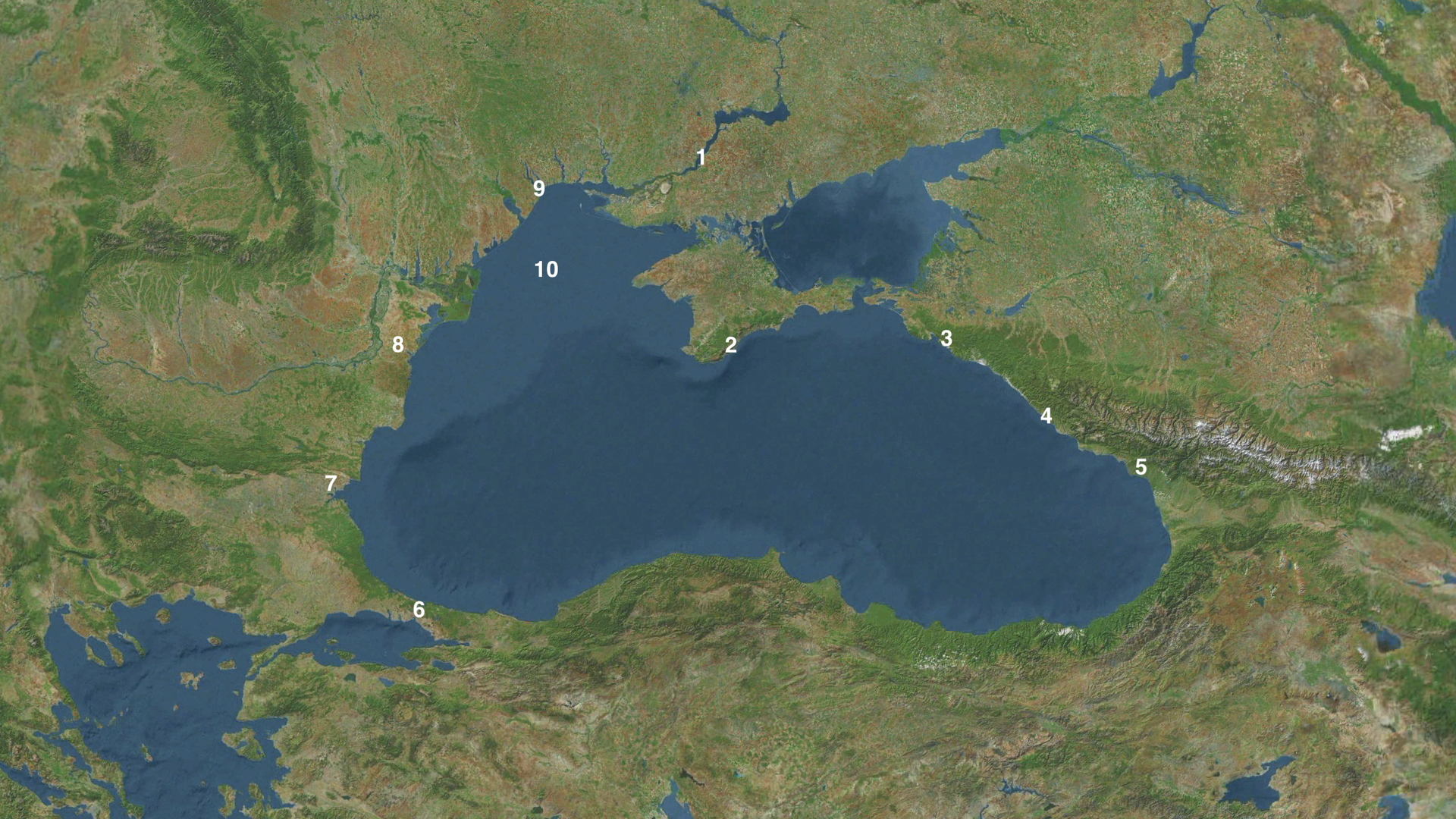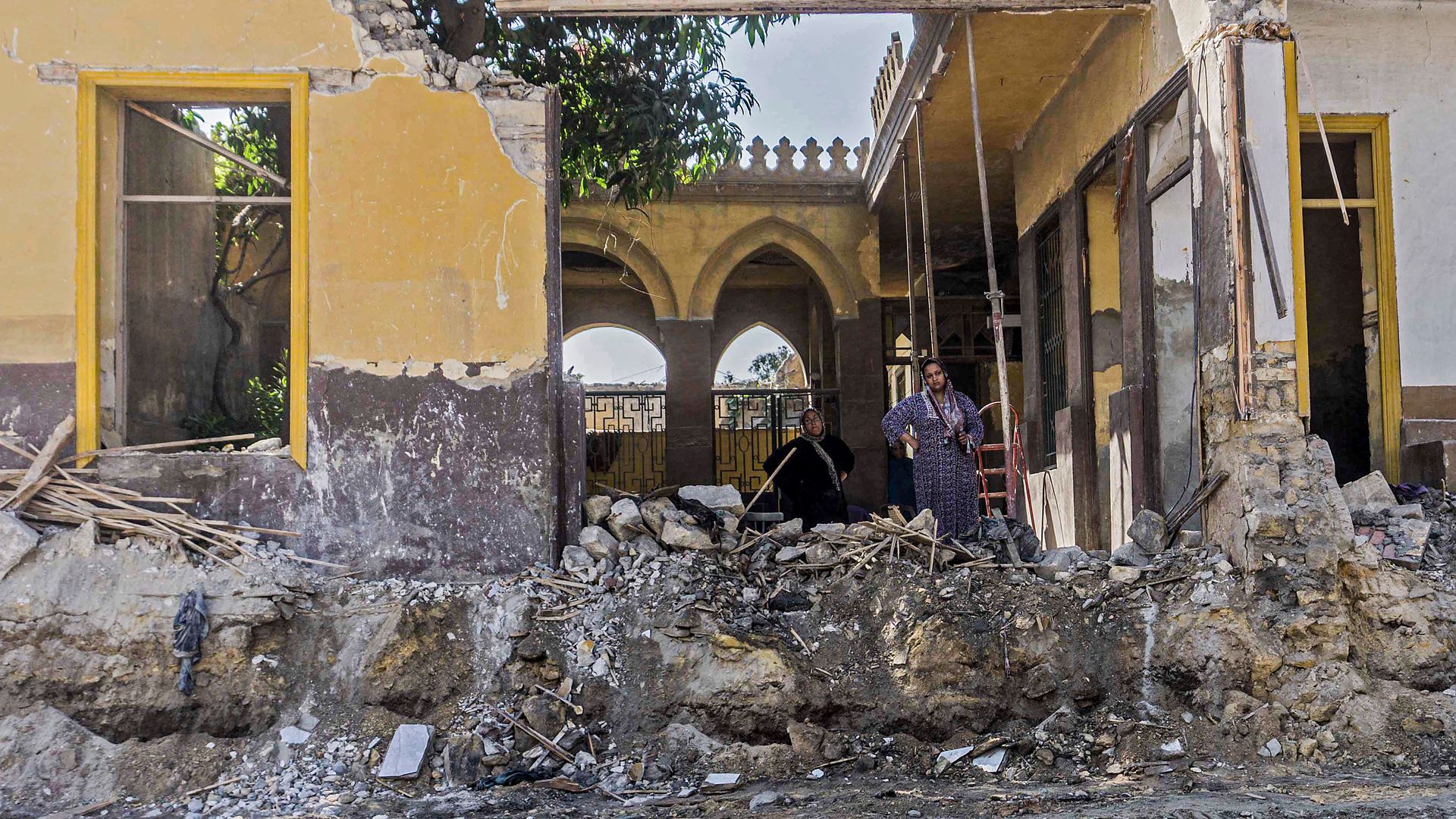| | | | | | | Presented By Kroger | | | | Axios World | | By Dave Lawler · Apr 25, 2022 | | Welcome back to Axios World. - In tonight's edition (1,733 words, 6½ minutes), we look at global military spending, Macron's big win, Beijing's lockdown fears and more.
New arrival? Subscribe. | | | | | | 1 big thing: $2 trillion for militaries around the world |  Global military spending topped $2 trillion in 2021 for the first time, with the U.S. accounting for 38% of that total, according to an annual report from the Stockholm International Peace Research Institute. The big picture: China's spending rose for the 27th consecutive year, and it's more than doubled over the past decade. China's growing power and Russia's increasing aggression have spurred other countries in Asia and Europe to increase their own defense budgets. - The U.S. and its NATO allies together account for 55% of global military spending. That rises to 61% if you include America's treaty allies in the Pacific: Australia, Japan, New Zealand and South Korea.
- That surpasses spending from U.S. competitors and adversaries Russia (3.1%), Iran (1.2%) and even China (14%). SIPRI did not estimate North Korea's spending.
- Even as a proportion of GDP, China spends less than half (1.7%) of what the U.S. (3.5%) does, according to SIPRI's estimate (China's military budget is notoriously opaque).
- Yes, but: China did narrow the superpower spending gap slightly in 2021, increasing its defense spending by 4.7% while U.S. spending fell by 1.4%.
The region that saw the biggest increase in defense spending was Asia and Oceania. - The biggest increases came in Japan (+7.3%) and Australia (+4%) — due primarily to concerns about China's rise.
Spending also increased in Europe. - Russian aggression has pushed NATO allies to move toward the alliance's target of spending 2% of GDP on defense.
- The numbers will likely be higher this year. After the invasion of Ukraine, Germany announced a massive infusion of defense spending.
The countries that spent the most as a proportion of GDP are almost all in the Middle East and North Africa, led by Oman (7.3%), Kuwait (6.7%) and Saudi Arabia (6.6%). - Africa accounted for just 1.9% of global military expenditures, but Nigeria — the biggest spender in sub-Saharan Africa — spent 56% more on the military last year than in 2020 as it faced severe security challenges, including from Boko Haram.
- Several countries in the Americas, including Argentina (0.6%) and Mexico (0.7%), spent less than 1% of GDP on defense.
On average, 6 cents of every dollar governments around the world spend goes toward the military, though the average is considerably lower in Europe and South America. - Countries like Belarus (30%), Qatar (22%) and Pakistan (18%) put an unusually high percentage of government spending toward the military.
By the numbers: - U.S., 38% of total global spending
- China, 14%
- India, 3.6%
- U.K., 3.2%
- Russia, 3.1%
- France, 2.7%
- Germany, 2.7%
- Saudi Arabia, 2.6%
- Japan, 2.6%
- South Korea, 2.4%
Worth noting: The U.S. spent more than the rest of the top 10 combined. |     | | | | | | 2. Macron beats Le Pen |  | | | Macron's victory speech. Photo: Louise Delmotte/Getty Images | | | | French President Emmanuel Macron comfortably defeated far-right candidate Marine Le Pen in Sunday's presidential runoff, 58.5% to 41.5%. Why it matters: From his (largely unsuccessful) attempts to influence Vladimir Putin and Donald Trump to his more fruitful efforts to strengthen the EU and turn it into a coherent foreign policy power, Macron has been one of the most ambitious and significant global players of the past five years. - Now arguably Europe's most senior statesman, he'll be in power until 2027 — and the far-right will go back to the drawing board.
- Le Pen conceded defeat but said the results showed there were "winds of change afoot" and she would continue to "stand up for the French people" and against Macron, whom she said would "destroy France" with his policies.
- Between the lines: Exit polls suggest that for both Le Pen and Macron, less than half of their votes came from genuine supporters and the rest from voters who simply hated the other candidate more.
What to watch: Macron, whose approval rating is just 36%, still faces big challenges at home, starting with parliamentary elections in June. - Both Le Pen and far-left candidate Jean-Luc Mélenchon are already trying to rally their voters to deny Macron's party a majority.
- If that happens, Macron would effectively lose control of day-to-day governance.
|     | | | | | | 3. U.S. to bring non-NATO allies into Ukraine summit in Germany |  | | | Austin (left) and Blinken (right) with Zelensky. Photo: Ukrainian Presidential Press Office via Getty Images | | | | The U.S. will host a conference of allies tomorrow at Ramstein Air Base in Germany aimed in part at streamlining the process of getting arms to Ukraine, as well as considering what Ukraine's defense needs will be after the war — such as transitioning away from Soviet-era weaponry. Zoom in: 43 countries were invited to the summit, Aaron Mehta of Breaking Defense reports. - They include all 29 NATO allies and 14 non-NATO members, including Ukraine. Two are prospective NATO members, Finland and Sweden, and four more are close U.S. allies in the Pacific (Australia, Japan, New Zealand, South Korea).
- The remaining invitees are from the Middle East (Israel, Jordan and Qatar) and Africa (Kenya, Liberia, Morocco and Tunisia), reports Mehta, who says that only around 30 countries had confirmed their attendance according to a tentative list.
- Secretary of Defense Lloyd Austin and his Ukrainian counterpart Oleksii Reznikov will open the proceedings, followed by a presentation by Chairman of the Joint Chiefs Gen. Mark Milley.
The latest: Austin said today that Ukraine can win the war if it gets "the right equipment." The backdrop: Austin was speaking in Poland alongside Secretary of State Tony Blinken a day after they met with Ukrainian President Volodymyr Zelensky in Kyiv. - During the visit, Blinken said U.S. diplomats would start to return to Ukraine this week — initially on day trips from Poland, but eventually from the embassy in Kyiv.
- Blinken also told Zelensky that President Biden would nominate Bridget Brink, the current U.S. ambassador to Slovakia, to fill the ambassadorial post in Kyiv that has been vacant since 2019.
|     | | | | | | A message from Kroger | | Investing in our associates | | |  | | | | At Kroger, our priority is to invest in our associates. Our average hourly compensation is over $22 when factoring in generous benefits like affordable health care, 401(k) plans and pensions. Learn more about the opportunities made possible by the Kroger Family of Companies. | | | | | | Bonus: Where in the world? |  | | | Screenshot via Apple Maps | | | | Tonight we're taking a tour of the Black Sea. Can you name all 10? 1. A river on which Kyiv also sits. 2. Site of a 1945 conference featuring Churchill, Roosevelt and Stalin. 3. Site of a "palace" built for this person, according to a 2021 Alexei Navalny investigation. 4. A resort city that hosted the 2014 Olympics. 5. A self-declared "republic" internationally recognized as part of Georgia. 6. Turkish strait through which the sea flows into the Mediterranean. 7, 8. Two EU members with Black Sea coastlines. 9. Ukrainian port city of 1 million people. 10. Approximate site where this Russian warship was sunk on April 14. Scroll to the bottom for the answers. |     | | | | | | 4. Shanghai tightens lockdown, Beijing could be next |  | | | People queue up at a COVID-19 nucleic acid testing site on April 25 in Beijing. Photo: Hou Yu/China News Service via Getty Images | | | | Residents of Beijing are stocking up on supplies and emptying supermarket shelves as rising COVID cases lead to fear the Chinese capital could be the next city placed under a strict lockdown. Driving the news: Beijing officials started mass testing of all residents in the city's most populous district today. Grocers are doubling their orders to keep up with demand, per Reuters. What to watch: If Beijing continues to stand by its "zero COVID" policy, as seems likely, major cities could be living on the edge of lockdown for months to come, with major implications for the global economy. |     | | | | | | 5. Global news roundup |  | | | The funeral of Talin Hamouy and her mother Sara Talib, who died when their boat sank in Tripoli, Lebanon, on April 25. Photo: Ahmad Said/Anadolu Agency via Getty Images | | | | Axios' Laurin-Whitney Gottbrath rounds up the latest headlines from around the world: 1. Funerals were held in Lebanon on Monday for some of the seven migrants and refugees who died when their boat sank as the country's navy tried to force it to turn around, per AP. - Since Lebanon's economic meltdown began in October 2019, hundreds have attempted to make it to Europe by sea.
2. More than 160 people were killed in attacks in West Darfur, Sudan, over the weekend, and the fighting has now spread to the city of Geneina, Reuters reports. - This is the latest escalation in a nearly two-decade conflict between Sudanese government-backed Arab janjaweed militia and mostly non-Arab armed groups. Hundreds of thousands have been killed and millions displaced since the fighting began, according to the UN.
3. El Salvador's Congress voted yesterday to approve President Nayib Bukele's request to extend the country's controversial anti-gang state of emergency for another month, AP reports. - More than 16,000 suspected gang members have been detained since the decree was approved in late March, following a spate of gang-related killings. Human rights groups say the emergency powers, which restrict public gatherings and other rights, infringe on civil liberties.
4. Canadian Prime Minister Justin Trudeau said today that an independent public inquiry will be established to examine his government's use of emergency measures in February to disperse protests against the country's COVID-19 restrictions. 5. Cuba today accused the U.S. of trying to exclude it from a regional summit set for June. The accusation comes just days after the U.S. and Cuba held migration talks. |     | | | | | | 6. What I'm reading: Living in limbo |  | | | Residents of the City of the Dead stand in the rubble. Photo: Khaled Desouki/AFP via Getty | | | | Cairo's City of the Dead is also home to tens of thousands of the living, Vivian Yee reports for the NYT. The government now plans to demolish much of the historic cemetery to make way for a bridge: - "Each family has a walled plot, in which a garden of palms and fruit trees surrounds an airy mausoleum. Marble tombs are carved with gilded Arabic calligraphy."
- "In the bigger plots, outbuildings once hosted living relatives who came on death anniversaries and major holidays to spend the night, honoring the dead with feasts and charity handouts."
- "The rest of the year, live-in caretakers maintained the mausoleums. That was how Fathy, 67, who also did not want his last name used, his wife, Mona, 56, and their three children came to live next to the tomb of Neshedil Qadin, a consort to the 19th-century ruler Khedive Ismail, considered modern Egypt's founder. Fathy's father and grandfather looked after the royal mausoleum, raising their children there before passing down their jobs and homes."
Dive in. |     | | | | | | 7. Stories we're watching |  | | | Displaced Ukrainians and members of the local community celebrate Orthodox Easter in Boyany, Ukraine. Photo: Andreea Campeanu/Getty Images | | | - EU deal paves way for strict Big Tech content rules
- U.S. and Israel to hold Iran talks
- COP26 chief on the next fight
- Amazon gets win in India
- World Bank: Damages total $60+ billion in Ukraine
- Ukraine aid could boost prospects for COVID package
- Bayern Munich wins 10th consecutive Bundesliga title
Quoted: "I was able to come this far with the support of many people. I hope you will continue to have fun, [and be] cheerful and energetic." — Kane Tanaka of Japan, before her death last week at the age of 119. Guinness World Records has confirmed that Sister André of France, 118, is "now officially the oldest person alive." |     | | | | | | A message from Kroger | | Life at Kroger: people matter | | |  | | | | At Kroger, we take seriously our role as one of America's largest employers. Since 2018, we've invested more than $4.5 billion in wage increases, training, pensions, and health care benefits for our associates. Learn more about the opportunities made possible by the Kroger Family of Companies. | | | | Answers: 1. Dnieper River; 2. Yalta; 3. Vladimir Putin ("Putin's Palace"); 4. Sochi; 5. Abkhazia; 6. Bosporus; 7. Bulgaria; 8. Romania; 9. Odessa; 10. The Moskva |  | It's called Smart Brevity®. Over 200 orgs use it — in a tool called Axios HQ — to drive productivity with clearer workplace communications. | | | | | | Axios thanks our partners for supporting our newsletters. If you're interested in advertising, learn more here.
Sponsorship has no influence on editorial content. Axios, 3100 Clarendon Blvd, Suite 1300, Arlington VA 22201 | | | You received this email because you signed up for newsletters from Axios.
Change your preferences or unsubscribe here. | | | Was this email forwarded to you?
Sign up now to get Axios in your inbox. | | | | Follow Axios on social media:    | | | | | |
Post a Comment
0Comments